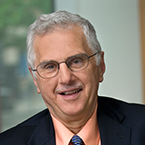
Internationally known for his contributions to characterizing the molecular and biochemical understanding of DNA replication, Dr. Alberts has transformed how cancer cells may be targeted by uncovering the fundamental mechanisms responsible for DNA synthesis. By utilizing the bacteriophage T4 as a model system, Dr. Alberts successfully created assays capable of allowing for the study of normal and rescued DNA synthesis. Through such assays, he defined the protein machinery responsible for coordinating DNA polymerase function and the process of DNA replication, specifically by utilizing DNA-cellulose columns to purify and analyze various DNA-bound proteins involved in the process.
These studies resulted in his characterization of several key components of DNA replication including the DNA or sliding clamp responsible for preventing the dissociation of DNA polymerase from the template DNA strand during replication, DNA primase, single-stranded DNA binding proteins, and the protein responsible for unwinding the parent DNA strand, DNA helicase. Further analysis of this process resulted in Dr. Alberts determining that DNA replication forks are capable of folding upon themselves to allow for recycling of DNA polymerase molecules during lagging strand DNA replication.
In addition to his scientific achievements, Dr. Alberts is widely recognized for his dedication to advancing science education, policy, and support for young trainees and investigators. He is one of the primary authors of the preeminent textbook in cell biology, Molecular Biology of the Cell, and has served as Editor-in-Chief of Science magazine. He has also been at the cornerstone of advocacy efforts in the field of science policy, working diligently to promote science education and research.
Career Highlights
2016 Lasker-Koshland Special Achievement Award in Medical Science
2014 National Medal of Science, National Science Foundation
2010 Vannevar Bush Award, National Science Board
2008-2013 Editor-in-Chief, Science magazine
2005 Commander of the Most Excellent Order of the British Empire
2000 Jawaharlal Nehru Birth Centennary Medal, Indian National Science Academy
1995 Canada Gairdner International Award
1993-2005 President, National Academy of Sciences, Washington, D.C.
1993 Elected Foreign Member, The Royal Society, London
1992 Baxter Award for Distinguished Research in the Biomedical Sciences, Association of American Medical Colleges
1987 Elected Fellow, American Association for the Advancement of Science
1981 Elected Member, National Academy of Sciences, Washington, DC
1978 Elected Fellow, American Academy of Arts and Sciences
1975 U.S. Steel Foundation Award in Molecular Biology
1965 PhD, Harvard University